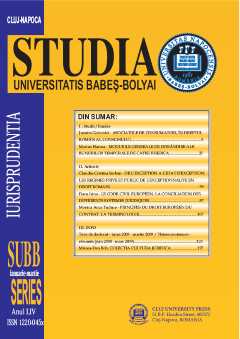MANDATUL EUROPEAN DE ARESTARE ÎN JURISPRUDENŢA INSTANŢELOR CONSTITUŢIONALE
THE EUROPEAN ARREST WARRANT, AS REFLECTED BY THE PRACTICE OF CONSTITUTIONAL COURTS
Author(s): Karoly BenkeSubject(s): Law, Constitution, Jurisprudence
Published by: Studia Universitatis Babes-Bolyai
Summary/Abstract: The European Arrest Warrant, as reflected by the practice of constitutional courts. The European Arrest Warrant was introduced by the Council Framework Decision 2002/584/JHA of 13 June 2002, being the first concrete measure which implemented, at the European Union level, the principle of mutual recognition in the field of criminal matters. The Framework Decision simplifies and speeds up the surrender procedures between the Member States, as the political and administrative phase of the traditional extradition procedures have been replaced by a judicial mechanism. Taking into account that the Framework Decision was adopted in the field of the 3rd pillar of the European Union, the Member States had to mandatory implement it in their national legislation. In this context appeared some conflicts between the national laws of implementation and the Constitutions of some Member States. With this problem had to deal the constitutional courts, which in some countries, like Poland, Germany or Cyprus, found these laws unconstitutional as they were contrary to some constitutional texts regarding extradition or the role of the national Parliament, although they were an exact transposition of the Framework Decision. Other Member States, due to their Euro friendly orientation or to some specific constitutional provisions, like Czech Republic or Romania, had no problem to pass these laws by the constitutional courts scrutiny. Another interesting aspect raised by this topic is a recent judgment of the Court of Justice of the European Communities given in a constitutional procedure which regards the national Belgian implementation law of the Framework Decision. These are the main subjects that will be presented and debated in this paper. Nonetheless, it will emphasize the key role of the constitutional courts in the process of the European legislation implementation and application at the Member States level.
Journal: Studia Universitatis Babes Bolyai - Iurisprudentia
- Issue Year: 52/2007
- Issue No: 1
- Page Range: 66-84
- Page Count: 19
- Language: Romanian

